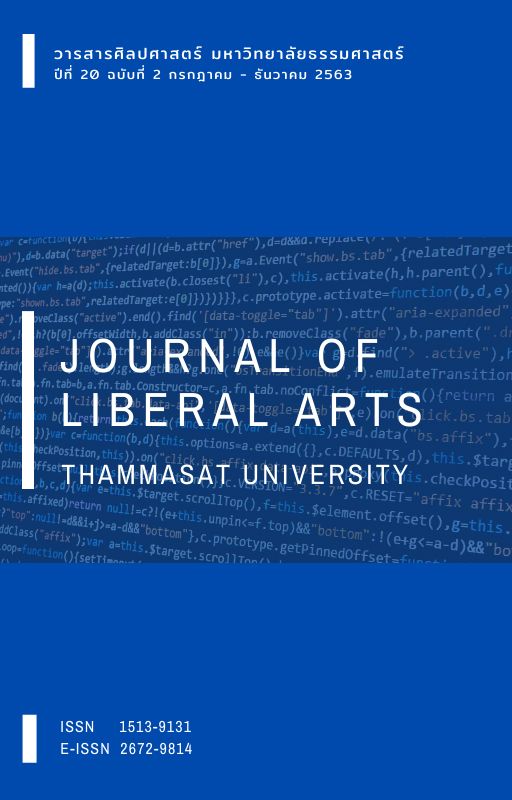การประยุกต์ใช้ปรัชญาเศรษฐกิจพอเพียงและจิตวิทยาการท่องเที่ยว: แนวทางขับเคลื่อนและฟื้นฟูการท่องเที่ยวโดยชุมชน หลังวิกฤตกาล โรคติดเชื้อไวรัสโคโรนาสายพันธุ์ใหม่ 2019 (โควิด-19)
Main Article Content
บทคัดย่อ
บทความนี้มุ่งเน้นแนวคิดเชิงทฤษฎีในด้านการท่องเที่ยวที่เกี่ยวข้องกับประเด็นของการประยุกต์ใช้ปรัชญาเศรษฐกิจพอเพียงและจิตวิทยาการท่องเที่ยวอันเป็นแนวทางในการขับเคลื่อนและฟื้นฟูการท่องเที่ยวโดยชุมชนหลังวิกฤตกาลโรคติดเชื้อไวรัสโคโรนาสายพันธุ์ใหม่ 2019 (โควิด-19) ซึ่งการนำเอาปรัชญาเศรษฐกิจพอเพียงมาขับเคลื่อนการท่องเที่ยวของชุมชนนั้น ประกอบด้วย 1) “ความพอประมาณ” คือ การวางแผนที่เข้าใจในศักยภาพและสิ่งที่ชุมชนมีผ่านการวิเคราะห์ปัจจัยหลักที่เรียกว่า “ทุนชุมชน” 2) “มีเหตุผล” คือ การขับเคลื่อนชุมชนเพื่อการท่องเที่ยวให้สามารถสร้างความดึงดูดใจ เข้าถึงได้ง่าย มีที่พัก สิ่งอำนวยความสะดวก และกิจกรรมการท่องเที่ยวที่ได้มาตรฐาน และ 3) “ภูมิคุ้มกันที่ดี” คือ มีการวางแผนในด้านต่าง ๆ อย่างมีประสิทธิภาพ โปร่งใส ตรวจสอบได้ และ 4) การปฏิบัติงานภายใต้เงื่อนไขด้านความรู้และคุณธรรมเพื่อให้การท่องเที่ยวของชุมชนพัฒนาได้อย่างยั่งยืน นอกจากนี้การนำเอากระบวนการหรือปัจจัยทางจิตวิทยามาประยุกต์ใช้จะเป็นการสร้างขวัญและกำลังใจที่ดีต่อนักท่องเที่ยวให้เกิดความเชื่อมั่นต่อชุมชน รวมถึงประชากรของชุมชนให้สามารถขับเคลื่อนการดำเนินงานพัฒนาการท่องเที่ยวของชุมชนตามปรัชญาเศรษฐกิจพอเพียงได้อย่างมีประสิทธิภาพ
Downloads
Article Details
เอกสารอ้างอิง
กระทรวงการท่องเที่ยวและกีฬา. (2558). แผนปฏิบัติการพัฒนาการท่องเที่ยวภายในเขตพัฒนา การท่องเที่ยวอารยธรรมล้านนา พ.ศ. 2559 - 2563. สืบค้นจาก https://www.mots.go.th/ewt_dl_link.php?nid=7120
กระทรวงมหาดไทย. (2557). กระทรวงมหาดไทยกับการเตรียมความพร้อมเข้าสู่ประชาคมอาเซียนภายใต้การดำเนินงานของศูนย์ปฏิบัติการร่วมกลุ่มจังหวัด. นนทบุรี: มติชนปากเกร็ด.
กองเศรษฐกิจการท่องเที่ยวและกีฬา. (2563). สถานการณ์การท่องเที่ยวในประเทศรายจังหวัด ปี 2563. สืบค้นจาก https://www.mots.go.th/more_news_new.php?cid=594
ชุติกาญจน์ กันทะอู. (2560). การท่องเที่ยวโดยชุมชนเป็นฐาน: กรณีศึกษาบ้านร่องฟอง ตำบลร่องฟอง อำเภอเมืองแพร่ จังหวัดแพร่ (วิทยานิพนธ์ปริญญามหาบัณฑิต). จุฬาลงกรณ์มหาวิทยาลัย, กรุงเทพมหานคร.
พจนา สวนศรี. (2560). การท่องเที่ยวโดยชุมชน. การประชุมเชิงวิชาการและการแถลงข่าว เรื่อง “รายงานภาวะเศรษฐกิจท่องเที่ยว ฉบับที่7”. สืบค้นจาก https://secretary.mots.go.th/ewtadmin/ewt/policy/download/TourismEconomicReview/1CBTByPotjana03042560.pdf.
สถาบันพัฒนาองค์กรชุมชน (องค์การมหาชน). (2558). คู่มือสนับสนุนการพัฒนาระบบเศรษฐกิจและทุนชุมชน. กรุงเทพ: สถาบันพัฒนาองค์กรชุมชน (องค์การมหาชน).
สำนักงานปลัดกระทรวงมหาดไทย. (2560). การน้อมนำหลักปรัชญาของเศรษฐกิจพอเพียงไปสู่การปฏิบัติจนเป็นวิถีชีวิต. กรุงเทพ: แดเน็กซ์ อินเตอร์คอร์ปอเรชั่น.
อนุรัตน์ อนันทนาธร. (2560). หลักปรัชญาของเศรษฐกิจพอเพียงในประเทศไทย: แนวทางสำหรับการพัฒนาประเทศยากจน. วารสารการเมือง การบริหาร และกฎหมาย, 9(ฉบับพิเศษ), 297-323.
ASEAN Secretariat. (2016). ASEAN Community Based Tourism Standard. Jakarta: The ASEAN Secretariat.
Barua, P., & Tejativaddhana, P. (2019). Impact of Application of Sufficiency Economy Philosophy on the Well-Being of Thai Population: A Systematic Review and Meta-Analysis of Relevant Studies. Journal of Population and Social Studies, 27(3), 195-219.
Bergsteiner, H., & Dharmapiya, P. (2016). Sufficiency Economy Philosophy Process. In G. C. Avery & H. Bergsteiner (Eds.), Sufficiency Thinking: Thailand’s Gift to an Unsustainable World (pp. 32-52). Sydney: Allen & Unwin.
Blackstock, K. (2005). A Critical Look at Community Based Tourism. Community Development Journal, 40(1), 39-49.
Cole, S. (1997). Anthropologists, Local Communities and Sustainable Tourism Development. In M. J. Stabler (Ed.), Tourism and Sustainability: Principles to Practice (pp. 219-229). UK: CAB International, Wallingford.
Dann, G. (1996). People of Tourist Brochures. In T. Selwyn (Ed.), The Tourist Image: Myths and Myth Making in Tourism (pp. 61-81). New York: John Wiley and Sons.
Economist Intelligence Unit. (2020). From Outbound to Bed-Bound: The Coronavirus Shock on Tourism. Retrieved from http://country.eiu.com/China/ArticleList/Analysis/
Economist Intelligence Unit. (2020). Coronavirus: What We Expect for Global Growth. Retrieved from http://country.eiu.com/article.aspx?articleid=1849161968& Country=United%20States&topic=Economy&subtopic=Recent+developments
Filep, S., & Laing, J. (2018). Trends and Directions in Tourism and Positive Psychology. Journal of Travel Research. 1-12.
Garcês, S., Pocinho, M., Jesus, S. N., & Rieber, M. S. (2018). Positive Psychology and Tourism: A Systematic Literature Review. Tourism & Management Studies, 14(3), 41-51.
Hall, C. M. (1996). Introduction to Tourism in Australia: Impacts, Planning and Development, Melbourne: Addison, Wesley and Longman.
Jason, L. A., Stevens, Ed., Ram, D., Miller, S., Beasley, C.R., Gleason, K., & Franklin, R. (2016). Theories in the Field of Community Psychology. Global Journal of Community Psychology Practice, 7, 1-27.
Jitsuchon, S. (2018). Monitoring Development Sustainability through Sustainable Community Indicators. Proceeding of the Economy, Sustainable Development and Energy International Conference (ESDEIC), Edinburgh, Scotland, UK, 2(1396), pp. 1-5.
Kitbumrung, M. (2018). Understanding SEP and Applying to Self Development. American Journal of Humanities and Social Sciences Research (AJHSSR). 2(5), 70-73.
Kotler, P. (2000). Marketing management. (10th ed.). Praha: Grada Publishing.
Laws, E. (1995). Tourist Destination Management: Issues, Analysis and Policies. Routledge Topics for Tourism. New York.
Lama, R. (2014). Community Based Tourism Development: A Case Study of Sikkim (Doctoral dissertation). Kurukshetra University.
Lee, T. H., & Crompton, J. L. (1992). Measuring Novelty Seeking in Tourism. Annals of Tourism Research, 19(4), 732-751.
Leung, R., & Law, R. (2010). A review of personality research in the tourism and hospitality context. Journal of Travel & Tourism Marketing, 27(5), 439-459.
Mongsawad, P. (2010). The Philosophy of the Sufficiency Economy: A contribution to the Theory of Development. Asia-Pacific Development Journal, 17(1), 123-143.
Papadoulis, M., & Minns, K. A. (2018). Toodyay Tourism Strategy 2018 - 2021. Perth, Australia: Icon Tourism Consulting.
Pearce, P. L., & Packer, J. (2013). Minds on the Move: New Links from Psychology to Tourism. Annals of Tourism Research, 40, 386-411.
Plog, S. C. (1974). Why Destination Areas Rise and Fall in Popularity. Cornell Hotel and Restaurant Administration Quarterly, 14(4), 55-58.
Qiu, R. T. R., Masiero, L., & Li, G. (2018). The psychological process of travel destination choice. Journal of Travel & Tourism Marketing, 1-32.
REST. (2003). Community Based Tourism: The Sustainability Challenge. Retrieved from http://www.iadb.org/int/ipn/English/support-files/REST-ENG pdf.
Shone, J. J. (2014). The Sufficiency Economy Philosophy (SEP) and Its International Role in Sustainable Development as seen in Application in the SEP Model Villages of the Lao P.D.R. and Timor-Leste. The 3rd MSSRC International Conference on "Mekong Region and ASEAN in Transition: People and Transborder Issues", Ubon Ratchathani University, Thailand.
Šimková, E. (2014). Psychology and Its Application in Tourism. 4th World Conference on Psychology, Counselling and Guidance WCPCG-2013, Procedia - Social and Behavioral Sciences, 114(2014). 317-321.
Taylor, G., & Davis, D. (1997). The Community Show: A Mythology of Resident Responsive Tourism. In M. J. Stabler (Ed.), Tourism and Sustainability: Principles to Practice (pp. 323–324). UK: CAB International, Wallingford.
Tuffin, B. (2005). Community-Based Tourism in the Lao PDR: An Overview. In NAFRI, NAFES & NUOL (Eds.), Improving Livelihoods in the Uplands of the Lao PDR (pp. 177-183). National University of Lao PDR.
U-tantada, S., Mujtaba, B. G., Yolles, M., & Shoosanuk, A. (2016). Sufficiency Economy and Sustainability. The 2nd Multidisciplinary Research and Innovation for Globally Sustainable Development (MRIGSD), Bangkok, Thailand.
World Health Organization. (2020). Coronavirus. Retrieved from https://www.who.int/health- topics/coronavirus
World Health Organization. (2020). Coronavirus Disease 2019 (COVID-19) Situation Report–70. Retrieved from https://www.who.int/docs/default-source/coronaviruse/situation-reports/20200330-sitrep-70-covid-19.pdf?sfvrsn=7e0fe3f8_2
World Travel and Tourism Council. (2019). Global Economic Impact & Trends 2019. Retrieved from https://www.wttc.org/-/media/files/reports/economic-impact-research/regions-2019/world2019.pdf


